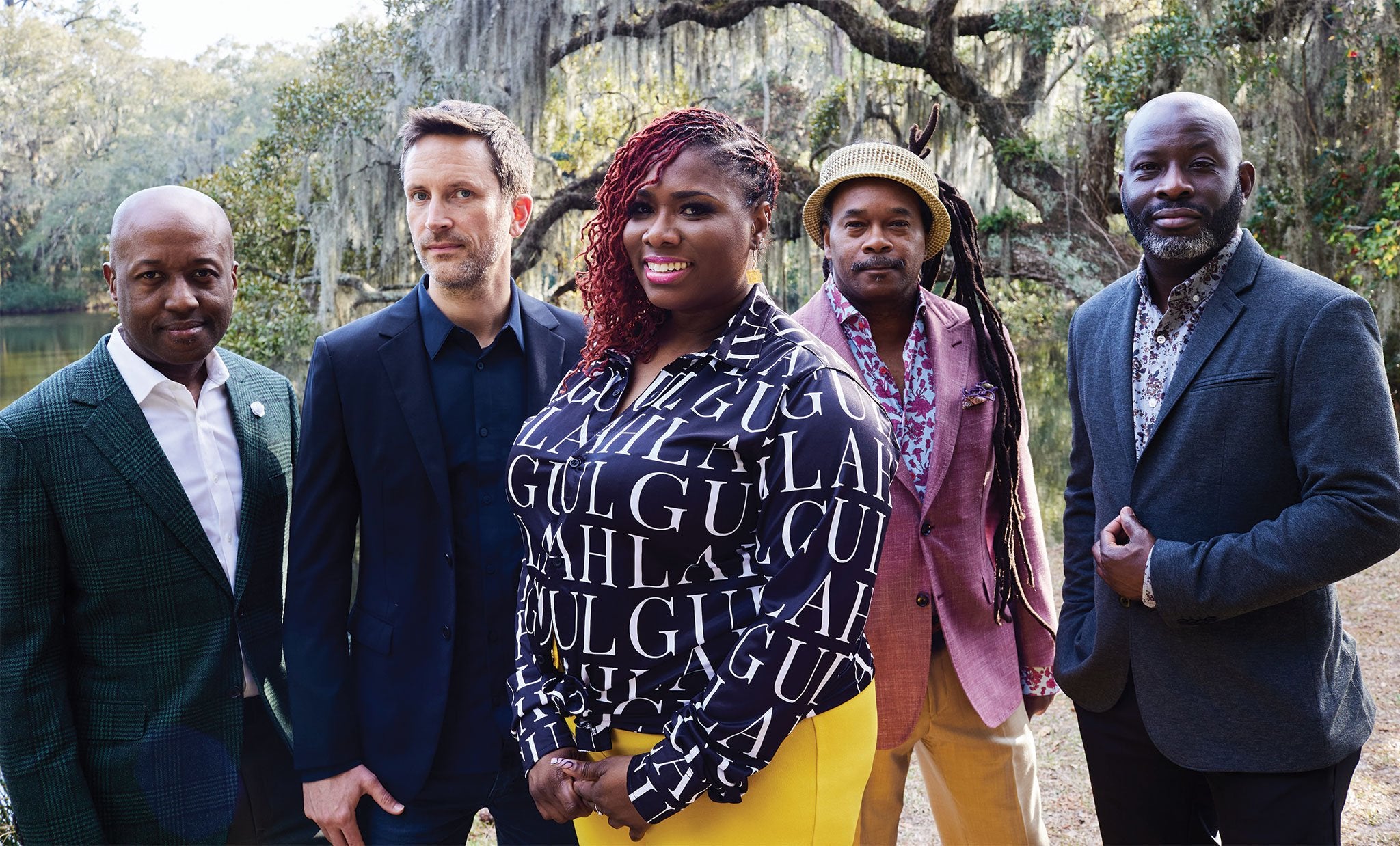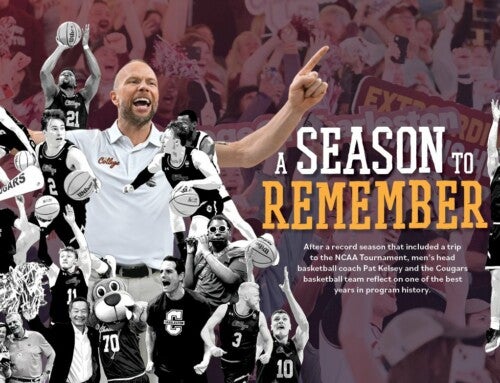Bump ba-da-ba-da–ba-da-bump.
Kevin Hamilton ’95 hugs the neck of his bass and closes his eyes as he strums. He wants to work out a distinct riff to build into the new song he and his bandmates are working on. “I’m just trying to do something a little different,” he says.
Under the hazy light of the wood-paneled recording studio, Clay Ross ’98 plucks out a soft Chuck Berry–inspired guitar line as vocalist and trumpet player Charlton Singleton lightly sings “Celebrate each day in a special way … .” Hamilton listens and then tugs at his strings in search of the right notes.
Less than a month after winning their second Grammy for Best Regional Roots Music Album for Live at 2022 New Orleans Jazz & Heritage Festival, the members of the Gullah-inspired band Ranky Tanky aren’t resting on their laurels. The longtime friends have made it a point to schedule some rehearsal time at Charleston’s Truphonic Studios to get going on new material. The unmarked building nestled between a spirits store, a storage facility and an ice cream shop offers a quiet place to come together and just play.
As the session continues, the song starts to fill out, with Quentin Baxter ’98 adding in a steady beat as calming as the ocean waves of the South Carolina Lowcountry.
“This definitely feels to me like something we could play,” says Ross.
“Let’s play it then,” quips Baxter.
When lead singer Quiana Parler arrives, her bright, buttery voice adds another depth to the group’s tone, melding their sound into something rich and soulful as she sings, “Gonna be all right – be all right!”
Founded in 2016, Ranky Tanky, named for the Gullah term loosely translated as “work it” or “get funky,” approaches the traditional sounds of Gullah music with both modern takes on traditional music as well as original compositions. The quintet draws its sound from the cultural traditions of enslaved West Africans who were brought to the sea islands of South Carolina, Georgia and North Carolina. The result is a bluesy blend of spirituals, contemporary gospel and jazz.
The group has had a steady rise in success. Their self-titled debut album hit No. 1 on Billboard’s Jazz and Contemporary Jazz charts in early 2018, and the band’s sophomore album, Good Time, debuted at No. 2 on Billboard’s Jazz chart in 2019 before earning them their first Grammy for Best Regional Roots Music Album in 2020.
But as meteoric as their rise may seem, Ranky Tanky’s journey started nearly 30 years ago with a series of haphazard encounters that can’t really be chalked up
to coincidence.
College Connection
If you drew a flowchart of which members of Ranky Tanky met each other first, the lines would quickly become as winding as the band’s path to the Grammys.
Baxter and Hamilton, both Charleston natives, first crossed paths in high school, before reconnecting through a mutual friend in the early 1990s. Baxter met Parler when she was around 11 years old when they performed a set at the now defunct Coconut Club in downtown Charleston.
Ross bumped into Baxter in an elevator in the College of Charleston’s Albert Simons Center for the Arts, and he first saw Hamilton when he came to play classical guitar for a music repertoire class Ross took his freshman year at the College. Singleton, meanwhile, initially intersected with Hamilton when he began playing organ at Hamilton’s church.
But it really was the College of Charleston that brought them all together. Baxter transferred to the College from the University of South Carolina in 1995 with plans to study jazz. Coming from a musical family – nearly everyone, including his mom, played drums – Baxter was already performing gigs around the state and eager to carve a niche for himself in the local music scene.
Like Baxter, Hamilton had also grown up surrounded by music. His mom played piano and sang, and his dad was an avid lover of music and art.
“There was always a bunch of vinyl, and there was always a world of music in my house growing up,” he says, adding that when he came to the College in 1991, he’d planned to major in classical guitar.
Ross, however, didn’t intend on pursuing a career in music when he arrived at CofC in 1994. He was leaning toward majoring in psychology because he “liked talking to people.”
“I didn’t have a frame of reference for a professional career in music, and I didn’t have a musical family,” he says.
But after realizing the field of psychology was a bit more involved than just “talking to people,” he started asking himself some poignant questions.
“I thought, ‘If I’m going to have to put this kind of work into anything, and in life you get out what you put in, then you should just give everything to something that you really love to do,’” says Ross, adding that by the end of his freshman year his hobby of playing guitar had become his professional pursuit. “I really loved music.”
All That Jazz
It’s always been about the music. Understanding it. Making it. Elevating it.
Under the tutelage of the late Tommy Gill ’93, a key figure in Charleston’s jazz scene and an adjunct music instructor who was instrumental in developing CofC’s jazz program in those early years, Baxter and Hamilton began to take root as jazz musicians. The trio founded one of the College’s first jazz combos and quickly began making a name for themselves and the school around the city.
Singleton, who graduated in 1994 from South Carolina State University with a degree in music performance, began sitting in with the group during rehearsals in the Simons Center Recital Hall after striking up a friendship with Hamilton and Baxter, who frequently bought jazz CDs from the King Street music store where he worked.
As their friendship grew, so did their shared passion.
“We never got kicked out of the Recital Hall,” recalls Baxter. “We always played until we were tired.”
In a lot of ways, the time and space the College’s faculty afforded Hamilton, Baxter and Ross allowed each of them to find their voice within the music. In fact, it led all three to ultimately major in music composition. Baxter, who served for nearly two decades as an adjunct instructor in jazz percussion at his alma mater, says music professors David Maves and Bill Gudger were especially influential in helping him understand the different musical styles and how they could apply to the music he wanted to make.
“They were fantastic for me because they challenged me,” he says. “Maves loved jazz, and it was really fun to talk with him about it, and Dr. Gudger was just wide open about everything.”
For Ross, music professor Edward Hart ’88 was among the faculty who helped him go from a “hippie kid” who liked rock ’n’ roll to a musician and composer confidently delving into a much wider array of genres.
Hart, who taught both Ross and Baxter, remembers them as “being very creative,” noting that even that early in their musical careers, they had an ability to meld their interests in popular music and jazz with other types of music. That, in turn, fueled their excitement for making new music, which led to a jazz renaissance that would eventually ripple far beyond the borders of campus.
“They were on the front end of what would become an emerging jazz program – one that we’re very proud of now,” says Hart. “And along with the emergence of the College’s jazz program came an emergence of jazz in Charleston. There’s more venues now. There’s more things going on in the jazz space now than there was 30 years ago.”
By the time Ross and Baxter graduated in 1998, Parler had already been studying jazz vocals with CofC faculty and performing with the College’s jazz ensembles while she was still in high school. Enrolling as a vocal major at the College was the logical next step.
And while Parler continued on as a full-time student at CofC, Ross, Hamilton, Baxter and Singleton began to branch out with a variety of musical endeavors, including jazz fusion band Gradual Lean, which became a mainstay in the Charleston jazz scene in the late 1990s and early 2000s.
But they were all still finding themselves as musicians, and their paths diverged. Baxter, Singleton and Hamilton became central figures in the region’s jazz scene, with all three playing key roles in the creation and growth of the Charleston Jazz Orchestra, now under the direction of Robert Lewis, visiting assistant professor and director of jazz studies at the College. Ross left the Palmetto State in 2003 and headed to New York, where he furthered his passion for mixing jazz and roots music as a jazz ambassador with the U.S. State Department before launching the Brazilian fusion band Matuto, which toured internationally for several years. And Parler left the College early after appearing on Season Two of American Idol. She quickly found herself touring as a backup singer for American Idol alums Clay Aiken and Kelly Clarkson and performing on The Tonight Show, Jimmy Kimmel Live and the American Music Awards while also growing her presence as a headlining performer back home in the Lowcountry.
By then, they had all performed with each other at one time or another, but they hadn’t considered a universe where they would all be part of the same group at the same time – until Ross had an idea.
Musical Roots
Traveling around the globe opened up a world of music for Ross, exposing him to an infinite sea of sounds. But the more he heard, the more he felt that something was missing from the international music lexicon.
The uniquely soulful and invigorating sound of Gullah music – and its cultural significance to the descendants of enslaved Africans from the sea islands of the southern United States – was largely unknown to much of the world.
With so much of his time spent researching and celebrating cultural and indigenous music from other countries, it was only natural that his interest would shift closer to home.
“I had spent quite a lot of time researching the music of Brazil and later just turned that curiosity toward my own roots as a South Carolinian,” says Ross.
He shared the concept with Singleton, Hamilton and Baxter and let his idea percolate for a few years – until 2016, when they brought in Parler as the lead singer and booked their first official gig as Ranky Tanky at the city of Charleston’s annual Christmas tree lighting celebration.
In early 2017, they played globalFEST in New York City, and by the end of the year, Terry Gross featured Ranky Tanky on NPR’s Fresh Air. A month later, their self-titled album reached No. 1 on Billboard’s Jazz and Contemporary Jazz charts, and the group skyrocketed with appearances on the Today show, The Late Show with Stephen Colbert and NPR’s Mountain Stage, as well as claiming their first Grammy award.
Their success was unexpected.
“We thought we were going to do, like, 10 gigs a year, and it’s ended up being over 50,” says Parler. “It’s been blessings on top of blessings.”
And something that could only have come with time, years of friendship and trust.
“We don’t have to have our eyes open. We don’t have to speak,” says Baxter. “We can just start playing and create.”
The group’s chemistry and talent has indeed reached new listeners across the country and around the globe. Scrolling through Ranky Tanky’s Instagram feed, you’ll find videos of crowds from as far away as Canada and Germany, who – despite having never heard of Gullah culture – are joyfully clapping and chanting, “Shoo Lie Loo – Ranky Tanky!”
That is as surprising, humbling and motivating as any of the band’s commercial success, says Hamilton.
“To see it – people who have no real idea of the music or what’s going on, but they just like it and they are having a great time – that makes you want to do more, give more,” he says. “It’s so inspiring.”
And The Grammy Goes To …
They were supposed to perform at the New Orleans Jazz & Heritage Festival in 2020 not long after they won their first Grammy. But the festival was canceled with the onset of the pandemic.
When they finally arrived for that performance in 2022, the pent-up energy of the audience, who had been eagerly awaiting the festival’s return, was palpable. As Ranky Tanky took the stage, that excitement swept through the band and erupted into an outpouring of music encapsulating friendship, faith and history – the history of the Gullah people and the history of the quintet of friends.
That was especially evident during the group’s rendition of “Stand By Me,” which put Parler’s powerful vocals on full display, punctuated by rich harmonies from Singleton and Ross and thumping rhythms from Hamilton and Baxter. The layering of sounds offered listeners a sense of gritty hope that clearly resonated.
As great as it sounded to the audience, Ross says the band was having audio problems on stage.
“There were challenges,” he recalls. But that’s what makes the Grammy all the more meaningful. “I think it says a lot about our live show because we weren’t thinking about it, and it wasn’t something we were scrutinizing in some way – it wasn’t too precious.”
In fact, the band didn’t think much more about the performance until six months later when, out of the blue, festival organizers reached out to say they liked the recording and wanted to enter it for a Grammy.
“To which we all responded, ‘What recording?’” chuckles Singleton, saying the group had forgotten the performance was recorded and had no idea it was on iTunes. “It was very unexpected.”
“It was a shock,” agrees Ross.
But having already won a Grammy in the same category, the group felt “confidently optimistic” that they had a good shot at taking home another. Even so, when they heard, “And the Grammy goes to Ranky Tanky,” Parler immediately jumped up from her seat, raised her hands and shimmied for joy as a wave of hugs spread across the bandmates before they took the stage to accept.
Just a few weeks later, Ross reflects on the moment: “You can’t plan; you can’t manufacture,” he says, his voice trailing off. “As Quentin says, ‘Plans are man’s, odds are God’s.’”
As far-reaching as Ranky Tanky’s success has been, it’s been felt the closest to home. Following the band’s second Grammy win, the city of Charleston declared Feb. 28 as “Ranky Tanky Day.” And the pride felt by those who were there from the beginning is enormous.
“We have a small music department. It’s not Juilliard. We’re not a big flagship university, but we have these graduates who are Grammy winners,” says Hart, noting that several other music faculty have also been associated with Grammy-nominated projects. “They are very much a reflection of the success of a small but mighty music program. And, in addition to being very talented, they’re just good people.”
Which is why the band was already back at work shortly after that second Grammy win.
“I feel like this was kind of a nudge from the universe saying, ‘Don’t be sleeping on this very special thing that is part of your life,’” says Ross. “We have to continue to give ourselves to this.”










